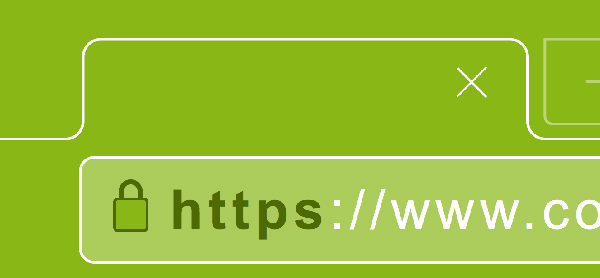
Benefits of having an SSL secure website
Recently Google implemented a new policy regarding unencrypted sites. They started penalizing sites without HTTPS (hypertext transfer protocol secure). Many website owners started seeing their Google ranking slip and traffic decrease. Though the change in policy caused a small panic among website owners, it’s not necessarily a bad thing. There are benefits of having an SSL secure website.
What is SSL?
Secure Sockets Layer (SSL) is a standard security technology for establishing an encrypted link between a server and a client—typically a web server (website) and a browser, or a mail server and a mail client (e.g., Outlook).
SSL allows important personal information such as credit card numbers, social security numbers, and login credentials to be transmitted securely. Normally, data sent between browsers and web servers is sent in plain text – leaving you vulnerable to eavesdropping. If an attacker is able to intercept all data being sent between a browser and a web server, they can see and use that information.
More specifically, SSL is a security protocol. Protocols describe how algorithms should be used. In this case, the SSL protocol determines variables of the encryption for both the link and the data being transmitted.
SSL secures millions of peoples’ data on the Internet every day, especially during online transactions or when transmitting confidential information. Internet users have come to associate their online security with the lock icon that comes with an SSL-secured website or green address bar that comes with an Extended Validation SSL-secured website. SSL-secured websites also begin with https rather than http.
Some benefits of have an SSL secure website:
1 – Your Google ranking will improve with an SSL secure website
As stated before, Google is penalizing websites without encryption. The good side of that is that they are giving preference to those who do have SSL. Improving your Google rank helps with your brand awareness and can lead to increased traffic. Increased traffic gives you the opportunity to turn leads into conversions – all of this culminates in increased sales.
2 – An SSL secure website protects sensitive information
As data moves between your client and you, it passes from one computer to another on its way to its final destination. Think of it as if it was the US Post Office. The mailman picks up a package at your house, then takes it to the local office, where it gets sorted. From there it goes to a distribution center where it gets sorted again. Finally, it moves to the recipient’s local office, and on to its final destination. A lot of people handled your letter during its journey, and any number of them could have looked at it.
The same is true with the information your clients give you over the internet. Their information moves from server to server until it reaches your site, it’s final destination. At any of those data stops, a person with bad intentions could easily copy the information. Your customers expect you to protect their information from these people with bad intentions.
Since you can do very little to keep that from happening, the best way to protect sensitive data is to send it written in code. HTTPS encrypts data so that it is unrecognizable. Once it arrives safely, the information is the decoded for use.
3 – Encryption provides authentication for users
One way identity thieves gather information is by setting up malicious web sites and pretending to be you. They can create almost identical versions of your website, or they build their own version where they misrepresent themselves as you. The user has no way of knowing that they are giving their sensitive information to criminals. However, your HTTPS designation on the URL shows visitors that your website has been verified as authentic. Google uses a visual cue, in the form of a padlock to demonstrate that it is an SSL secure website. This symbol creates a sense of security for your customers.
4 – PCI compliance requires you to have an SSL secure website
If you process any credit card transactions on your site, then you are required to have encryption. The Payment Card Industry Data Security Standard (PCI DSS) applies to all companies, online or not, that accept credit card payments. For online companies, this compliance means you must have an SSL secure website. No legitimate e-commerce site can operate without an SSL certificate. The only ‘out’ is if you go through a third-party payment processor such as Paypal. In such a case, Paypal accepts responsibility for the handling of your customer’s financial information.
Having an SSL secure site allows you handle your own financial transactions. Third-party services like Paypal or Stripe can be expensive and can cost you up to 5% in transaction fees. Keep in mind that the free SSL certificates won’t work for e-commerce. Instead, you need to contact your web agency and ask for one that is appropriate for your application. An SSL certificate generally runs a couple of hundred dollars a year.
Having an SSL secure website ensures that your clients don’t lose trust in your company. There is nothing worse than having a “this is not a trusted site” message flashing before their eyes as they move to complete a transaction. It’s a pretty safe bet you will lose some business.




